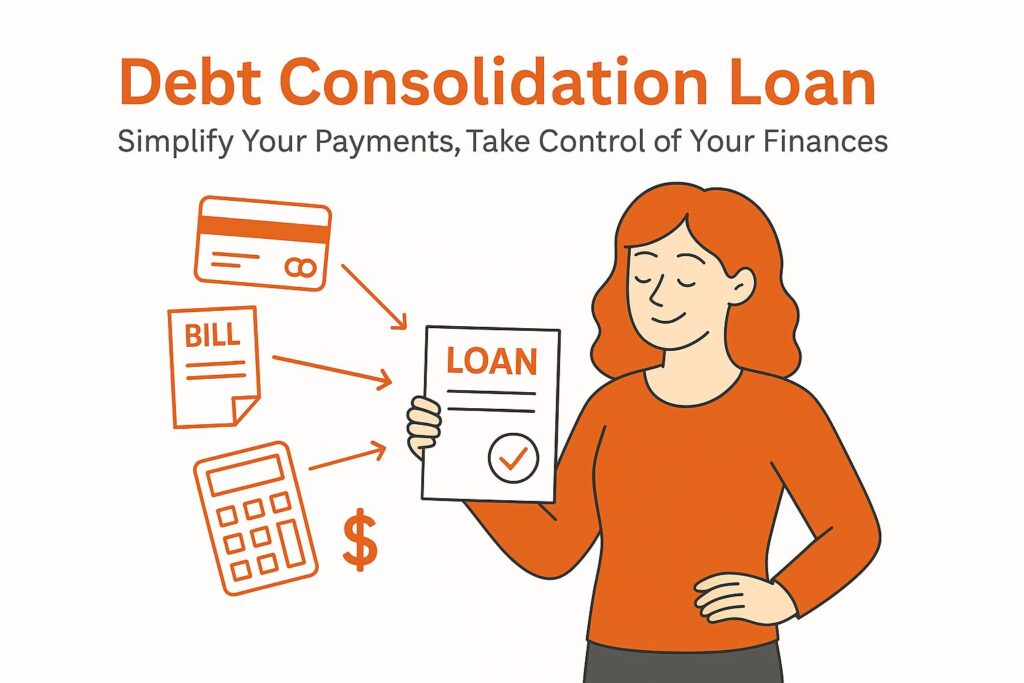If you’ve ever felt overwhelmed by multiple debts, juggling due dates, interest rates, and minimum payments, you’re not alone. Managing finances can get complicated fast, especially when credit cards, personal loans, or medical bills start piling up. That’s where a Debt Consolidation Loan steps in as a potential lifesaver.
In this comprehensive guide, we’ll break down everything you need to know about a debt consolidation loan, how it works, who it’s for, its pros and cons, and how to decide if it’s the right step for you. Let’s make debt make sense again.

What Is a Debt Consolidation Loan?
A debt consolidation loan is a type of financing that allows you to combine multiple debts into a single loan—typically with one monthly payment and often at a lower interest rate. Instead of managing several accounts, you only have one, making it simpler to stay on top of your payments.
These loans are usually unsecured personal loans, but homeowners may also opt for secured options like home equity loans or lines of credit.
How Does It Work?
Here’s a quick breakdown of how a debt consolidation loan works:
- Application: You apply for a loan with a bank, credit union, or online lender.
- Approval: If approved, you receive a lump sum or the lender directly pays off your existing debts.
- Repayment: You repay the new loan in fixed monthly installments over a set term.
It’s really that straightforward—but the strategy behind it is where the real value lies.
Types of Debt You Can Consolidate
A debt consolidation loan can cover many types of unsecured debts, including:
- Credit card balances
- Medical bills
- Personal loans
- Payday loans
- Store card balances
- Utility arrears
Note: Student loans typically require specialized consolidation or refinancing options.
Benefits of a Debt Consolidation Loan
There are some compelling reasons why people choose debt consolidation:
1. Simplified Finances
One loan, one payment. It’s less stressful and easier to manage.
2. Lower Interest Rate
If you have decent credit, you may qualify for a loan with a lower interest rate than what you’re currently paying.
3. Improved Credit Score
Paying off high-interest credit cards and reducing your credit utilization ratio can give your score a boost.
4. Fixed Payment Schedule
Unlike credit cards with fluctuating balances and interest, a consolidation loan has a clear end date.
When Is a Debt Consolidation Loan a Good Idea?
A debt consolidation loan makes sense when:
- You have high-interest debt that’s eating up your monthly budget.
- Your credit score is good enough to qualify for a lower interest rate.
- You’re committed to responsible financial habits going forward.
- You’re tired of managing multiple payment dates and minimums.
If these sound like you, it might be time to explore this option seriously.
What to Consider Before Applying
Like any financial decision, a debt consolidation loan isn’t one-size-fits-all. Here are key factors to weigh:
- Interest rate: Aim for a rate that’s lower than your current debts.
- Loan term: A longer term can reduce your monthly payment, but may increase total interest paid.
- Fees: Check for origination fees, prepayment penalties, or hidden charges.
- Your budget: Can you comfortably make the new monthly payment?
Always compare offers from multiple lenders to get the best deal.
Where to Get a Debt Consolidation Loan
You have several options when shopping for a debt consolidation loan:
- Banks: Traditional institutions may offer competitive rates for those with good credit.
- Credit unions: Usually more flexible and member-friendly.
- Online lenders: Convenient and fast—many offer instant quotes and pre-approvals.
- Peer-to-peer lenders: Platforms like LendingClub or Prosper may provide loans based on non-traditional criteria.
Debt Consolidation Loan vs. Other Options
Balance Transfer Credit Card
Great if you can repay within the 0% interest promotional period. Not ideal for larger or longer-term debt.
Home Equity Loan or HELOC
Useful if you have equity in your home, but riskier—your home is on the line if you default.
Debt Management Plan
Offered through credit counseling agencies, these plans negotiate lower rates and combine payments but may affect your credit.
Each option has its place depending on your situation.
Risks and Drawbacks
While a debt consolidation loan can be empowering, it’s not a magic bullet. Potential downsides include:
- Debt trap: Without behavioral changes, you might accumulate new debt while still paying off the loan.
- Fees: Some lenders tack on hefty fees that reduce your savings.
- Impact on credit: Hard inquiries and new credit accounts can temporarily ding your score.
It’s crucial to stay disciplined and avoid racking up new balances.
How to Apply for a Debt Consolidation Loan
Follow these steps to make the process smooth:
- Assess your debt: Know your balances, interest rates, and monthly payments.
- Check your credit score: Higher scores mean better loan terms.
- Compare lenders: Look at rates, terms, fees, and customer reviews.
- Apply: Provide income, employment, and financial details.
- Use funds wisely: Pay off all debts immediately.
- Stick to the plan: Set up autopay, track your progress, and avoid new debt.